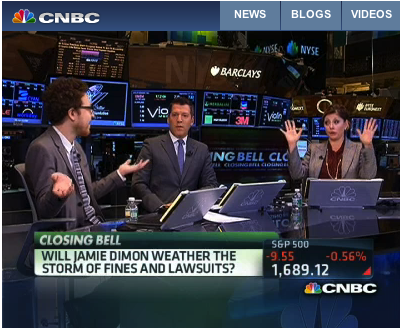Watch CNBC Rush To The Defense Of JPMorgan Chase CEO Jamie Dimon
If you go on TV to argue a controversial viewpoint, it’s to be expected when the host of the show questions you on your allegations. But what happened last Friday on CNBC’s Closing Bell is just an embarrassing example of how far a financial “news” network will go to defend the head of a huge bank just because that institution is performing well on the stock exchange.
The topic of discussion (for want of a better term) was JPMorgan Chase CEO Jamie Dimon, whose bank has — just in the last couple weeks — reached more than a billion dollars in settlements tied to everything from the London Whale debacle of 2012 to bogus credit card protection plans, and who is currently trying to negotiate the biggest single fine in Wall Street history over allegations that it knowingly unloaded billions in toxic mortgage securities.
Before even getting to the debate over whether Dimon should remain as CEO, co-host Maria Bartiromo showed exactly where her loyalties lie, declaring, “JP Morgan remains one of the best, if not the best performing major bank in the world today.”
On hand to make the case for Dimon to hit the bricks was Salon’s Alex Pareene, who argued that, “If you managed a restaurant, and it got the biggest health department fine in the history of restaurants, no one would say ‘Yeah, but the restaurant’s making a lot of money. There’s only a little bit of poison in the food.'”
The first example of coming to the bank’s defense came after Pareene said that the bank might be too big, too complicated, and “too corrupt” for anyone to properly lead it. This led co-host Scott Wapner not to question that allegation (again, against a bank that is currently negotiating an $11 billion settlement for being corrupt), but to simply call it “hyperbolic” before tossing a softball to Duff McDonald from Fortune.
“It’s preposterous. The stock’s touching a ten-year high,” said McDonald. “It’s a cash-generating machine. Sure they’ve have their regulatory issues but he’s looking to settle them expeditiously, which is everything you want out of a CEO.”
“Should we talk about the financial strength of JPMorgan at this point?” asks Bartiromo, returning to her cheerleading for Dimon. “Even with all of these losses, the company continues to churn out tens of billions of dollars in earnings and hundreds of billions of dollars in revenue. How do you criticize that?”
Pareene attempts to point out that much of the revenue has come from “really shady dealings” like alleged bribery in China, to which Bartiromo responds that “You shouldn’t be saying things you can’t prove.”
“Hiring the children of prominent Chinese officials isn’t something I just made up,” answers Pareene, citing a NY Times article.

Note to Andrew Ross Sorkin: This is what your CNBC co-worker Maria Bartiromo thinks of the “facts” in your DealBook column.
(Of course, she doesn’t point out that her CNBC co-worker Andrew Ross Sorkin is the founder of DealBook, the very column which Pareene cites.)
And so it devolves from there, as the co-hosts and McDonald alternate between mocking Pareene and praising Dimon, talking about how he may (heaven help us) be a future Treasury Secretary.
The short 6-minute segment has gotten a lot more attention than most people would normally pay to CNBC, thanks in no small part to Reuters’ Felix Salmon, who wrote of the horror he witnessed on TV:
This view — that profits cleanse all sins, and that so long as you’re making money, nothing else matters — is not normally expressed quite as explicitly as it was here. After all, there are licit and illicit ways of making money, and surely if your profits fall into the latter category, you should not be able to remain comfortably ensconced as a celebrated captain of industry.
In a response to the piece posted today on Salon, Pareene admits he might have made a mistake:
I may have erred in citing the notoriously liberal New York Times… when the same information has also been reported in more business-friendly outlets like Bloomberg and the Wall Street Journal.
As for Bartiromo’s repeated questioning about who out there could possibly do a better job of running Chase than everyone’s favorite CEO, Pareene responds, “I don’t think Jamie Dimon’s job, or his bank, should exist at all in their present states. I think the exclusive focus by corporations on shareholder value has been pretty awful for the world economy and its poor and working classes, and I think the idea that profitability is its own justification is not a viewpoint shared by anyone outside the bubble of the 0.1 percent, but I have absolutely no fucking clue who should run JPMorgan Chase and Co. Let Maria Bartiromo run it, how is it going to get any worse?”
Want more consumer news? Visit our parent organization, Consumer Reports, for the latest on scams, recalls, and other consumer issues.

